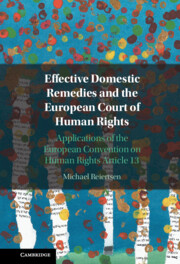 Effective Domestic Remedies and the European Court of Human Rights
Effective Domestic Remedies and the European Court of Human Rights Published online by Cambridge University Press: 11 August 2022
Chapter 7 analyzes the applicability criterion of arguability, which requires that the applicant has an arguable claim that substantive rights in the Convention are violated for Article 13 to apply. The chapter first queries how this criterion relates to the scope of application of substantive rights. Is it sufficient to be arguably within the scope of substantive rights, for Article 13 to apply, or is it necessary to actually be within the scope? Although the Court's case law is not explicit, it reveals that it is necessary to be within the scope. This result is critcized. The chapter proceeds by analyzing the required threshold of arguability. Even though the Court has not provided an abstract definition, but, rather, determines on a case-by-case basis whether each individual claim is arguable, the Court has linked arguability to the international admissibility criterion of manifestly ill-founded. However, this adversely affects the arguability ctest and does not chime well with the principle of subsidiarity. The chapter argues that the Court needs to remove this linkage.
To save this book to your Kindle, first ensure no-reply@cambridge.org is added to your Approved Personal Document E-mail List under your Personal Document Settings on the Manage Your Content and Devices page of your Amazon account. Then enter the ‘name’ part of your Kindle email address below. Find out more about saving to your Kindle.
Note you can select to save to either the @free.kindle.com or @kindle.com variations. ‘@free.kindle.com’ emails are free but can only be saved to your device when it is connected to wi-fi. ‘@kindle.com’ emails can be delivered even when you are not connected to wi-fi, but note that service fees apply.
Find out more about the Kindle Personal Document Service.
To save content items to your account, please confirm that you agree to abide by our usage policies. If this is the first time you use this feature, you will be asked to authorise Cambridge Core to connect with your account. Find out more about saving content to Dropbox.
To save content items to your account, please confirm that you agree to abide by our usage policies. If this is the first time you use this feature, you will be asked to authorise Cambridge Core to connect with your account. Find out more about saving content to Google Drive.